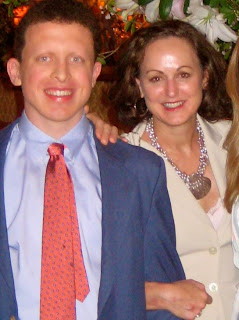
When writer Laurie Colwin died of a heart attack in 1992 at the age of 48, I was as crushed as if she had been a friend of mine. I loved her essays, short stories, and novels! Her last, posthumously published book was entitled "A Big Storm Knocked it Over."
For me, the big storm that altered life as I knew it, that wave that almost took me out, was the birth of my son Ben.
For your sake as well as Ben's, I'll try to be quick about this story, but still give you the full picture. Here goes:
A young woman loves literature and dreams of writing it. She has a job as a Creative Director and copywriter and she publishes a few magazine articles and essays. She gets married (finally!) and gets pregnant. And then the storm clouds gather.
A sonogram shows that the baby isn't measuring up properly. Down syndrome? Amnio says no. Dwarfism? Doctors say maybe. They can tell her that something isn't right, but they can't determine what and why. Mom has to go to bed for six weeks because the baby keeps trying to be born. One day he isn't moving. Emergency C-section. Apgar score is 4 (out of a possible 10). Baby is not a dwarf, but he has an enlarged liver and heart, hypoglycemia, polycythemia, dangerously low platelet count. Situation described as grim. In intensive care for three weeks, but pulls through and comes home on Thanksgiving Day. Joy. Apprehension. Baby cries and screams a lot. Can't breastfeed, can't swallow from the bottle very well.
The water gets really rough. Developmental delays, sensory integration disorder, perseveration, low muscle tone, auditory processing problems, ADHD, social issues, emotional lability, more screaming, etc., etc., etc. He does not receive a diagnosis of autism (perhaps his doctors were afraid that his mother would completely disintegrate if they used that word), but he has several of the characteristics. Baby sister is born. Beloved father/grandfather dies.
I think it goes without saying that I quit getting much writing done, just freelance writing for nonprofit organizations in order to make some money. Some days I barely got any breathing done. Some days I was drowning.
But bit by bit, year by year, the sun came out. Ben is now 21 - and he is wonderful. He can't do complex math, doesn't drive, and struggles to write a paper without help. But he is kind and helpful, loving and loyal, passionate about fitness and sports, history and Greek mythology. His glass is always half full. He has a high emotional IQ, is empathetic and spiritual. He is a student at Chattahoochee Tech and a collegiate athlete, running on Chatt Tech's cross country and track teams. He is an advisor for our church's youth group, works two days a week on an organic farm, and aspires to be a personal trainer.
How did I overcome this obstacle to my writing life? Love, patience, and the passage of time. Therapy (for both of us). Medication (for both of us). Prayer. The advice of experts and the kindness of strangers: all sorts of people threw us lifelines.
When Ben graduated from high school a couple of years ago, I gave myself permission to resume my quest to be a writer of literature and entered the MAPW program. Sometimes I panic believing that it is too late for me to write anything significant, but sometimes I think I can still do it. I'll have to admit that, because of what I have been through, at times I feel like a burned-out case.
But mostly I am grateful. I know that I am a far better person than I was before Ben Lewis came into my life. And I am blessed to have him and his unsinkable spirit to inspire me every day for the rest of my life.











